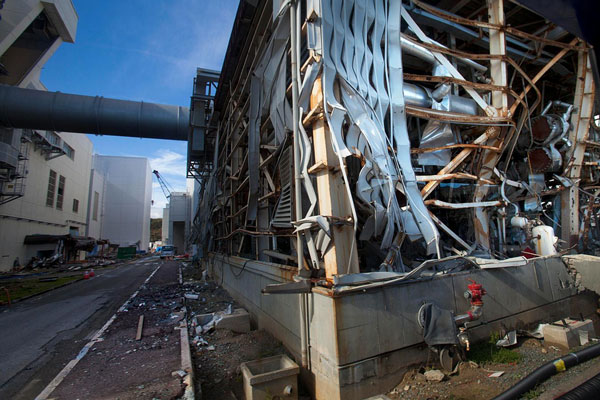Nuclear reactors in Fukushima reached a steady state
Japan announced yesterday that reactors at the tsunami-affected nuclear power plant have achieved a "cool off" condition , marking an important step in the nine-month nuclear crisis.
>>>Officially closed Fukushima nuclear power plant
Japanese Jiji reported that Japanese Prime Minister Yoshihiko Noda said at the nuclear working group meeting that the Fukushima plant's crippled reactors "have reached a state of cooling off, meaning that the tried to be controlled ".
The control of reactors causing radioactive leakage into the sea and air marked the success of the Japanese government's "second step" in an effort to tackle the devastating nuclear crisis that began in March.
The "step one" of remedial work is to cool the reactors and fuel tanks, which were declared successful in July. "Second step" this time is to continue cooling the reactors and houses. The machine can be considered to be controlled.

The situation at Fukushima damaged nuclear power plant has been controlled.
The central task will now be to stop operations for damaged parts, warned that it will take decades.
The Japanese government hopes that the announcement to control the situation at the Fukushima plant will ease people's obsession with the aftermath of the terrible earthquake and tsunami in March.
However, Telegraph quoted Takashi Sawada, vice president of Japan National Atomic Energy Association, an expert of the pro-nuclear power production group, said he was worried because he did not see the Government and the Company. Tokyo Electric Power (TEPCO) made it clear whether the four damaged reactors are now safe.
"But I think it can be said that the reactors have reached a relatively stable state of cooling," he said. And he added that the current amount of radiation leakage is very small compared to when the new factory was destroyed.
And Mr. Tetsunari Iida, director of the Institute of Sustainable Energy Policy, a group opposed to nuclear energy production said the term "cool off" and "out of operation" was misinterpreted, he worried about the terms. This will make everyone think everything is okay.
"The shutdown they are talking about is not the fact that fuel tanks are removed, the plants are dismantled as a shutdown that we often think of. This takes at least 40 years or has It may take longer, " Iida said.
The nuclear crisis was reported to cause no direct human damage, but tens of thousands of people living around the plant were evacuated to avoid the effects of radiation. Forests around the factory area that are also contaminated with radioactivity are reputable for the nuclear power industry, which accounts for one-third of Japan's power output.
- Smoke, steam rising from 2 Japanese reactors
- It takes 40 years to close Japanese nuclear power plant
- Japan plans to bury the reactors
- Japan's last nuclear reactor stopped working
- The reactors at Fukushima No.1 are basically stable
- Freezing lands around Fukushima factory
- Japan: Save the successful reactors 5 and 6
- Japan opened the Fukushima I nuclear reactor reactor
- Space nuclear reactors help to colonize Mars
- Nuclear reactors supply electricity to Martian settlers
- Japan can restart the Ohi nuclear reactor
- Classification of nuclear reactors
 Is the magnetic North Pole shift dangerous to humanity?
Is the magnetic North Pole shift dangerous to humanity? Washington legalizes the recycling of human bodies into fertilizer
Washington legalizes the recycling of human bodies into fertilizer Lightning stone - the mysterious guest
Lightning stone - the mysterious guest Stunned by the mysterious sunset, strange appearance
Stunned by the mysterious sunset, strange appearance Was there nuclear war in ancient times?
Was there nuclear war in ancient times?  How do the superpowers build nuclear power models?
How do the superpowers build nuclear power models?  China successfully builds megawatt-scale space nuclear reactor
China successfully builds megawatt-scale space nuclear reactor  Nuclear battery smaller than a coin, phone can be used for 50 years without charging
Nuclear battery smaller than a coin, phone can be used for 50 years without charging  Rare Element Plutonium - What Do You Know About It?
Rare Element Plutonium - What Do You Know About It?  The mystery of the 4,000-year-old nuclear explosion at India's 'hill of death'!
The mystery of the 4,000-year-old nuclear explosion at India's 'hill of death'! 